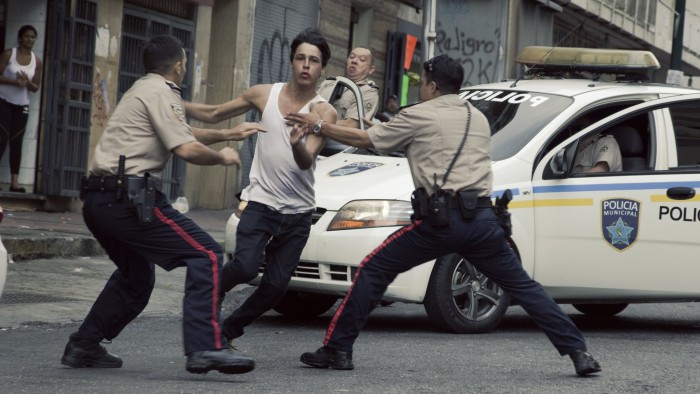Venice Film Festival: Golden Lion

Roula Khalaf, Editor of the FT, selects her favourite stories in this weekly newsletter.
You could have heard a pin drop, in the film festival’s giant press room, in the half-second after the 2015 Golden Lion winner was announced. A hand-grenade pin. We critics, watching the prize-giving on screens, were all struck dumb. Why? We were waiting for our careers to explode. Why? Because we had all got it wrong. In the daily critical ratings poll published only the day before, Lorenzo Vigas’s Desde Allá (From Afar), a Venezuelan drama, was ranked next to last out of 21 competition films.
Now it was the toast of the Lido. Had it helped the Lion victor to have a Latin American jury president, Alfonso Cuarón (Y Tu Mamá También, Gravity)? Had it helped that Latin America had never won at Venice before? It had surely helped that the film showed late in the festival. Undecided jurors could be swayed by an impudently transgressive plot: the December/May gay romance between a commitment-phobic older man (Chilean actor Alfredo Castro), preferring voyeurism to intimacy, and the street boy (Luis Silva) he falls for with unexpectedly reciprocated results. It ends with a shocking and powerful twist. Before that it’s taut, tense, often involving — but stylistically no more remarkable than a TV play.
Modest form and intimate content, though, may have appealed to the jury. They were novelties in a festival of big-issue or big-gimmick favourites. Critics and public both liked Russia’s second world war-themed Francofonia, as well as China’s late-screened docu-epic about ecological doom, Behemoth. Liang Zhao’s film (see below) stood top of the reviewers’ poll on the last morning. Anomalisa — big on mischief and originality with its CGI-animated adult love story — won the Grand Jury Prize. Applause greeted that, as it did the Best Director award to Argentine film-maker Pablo Trapero for his darkly crafted kidnapping tale El Clan.

The boos came earlier in the junket. A Best Actor prize went to France’s Fabrice Luchini for being Fabrice Luchini in the court drama L’Hermine. A Best Actress went to Italy’s Valeria Golino, long ago the female lead in Rain Man, for doing nothing special in Per Amor Vostro. Exception was made for teenaged Abraham Attah, who plays with power and intensity a child soldier in the African-set war drama Beasts of No Nation: he was cheered all the way to the Best Young Actor prize.
Before this there were 40 minutes of gongs and gab for sideshow films some of us hadn’t even seen. A long evening was made longer.
The festival needed something explosive. No one had expected the bomb to be set off by an award, the Golden Lion, rather than by a movie.
But Venice always surprises. That’s why it is still going, though festooned with warning signs of debility. The sponsored razzmatazz adorning the Palazzo del Cinema has been the same for years. (It used to change annually.) Likewise the pre-movie logo reel, the festival’s visual equivalent of an ad jingle. But after a sluggish beginning, the competition itself showed some pep and portent.
China’s Behemoth can complain — loudly — about going prizeless. This momentous essay-documentary, in a competition rich with other examples of that form (Francofonia, Heart of a Dog), takes us to the heart of Hell, Mongolia-style.

Director Liang Zhao has read Dante and sometimes reads him to us, or adapts him for his own context. He starts with Purgatory — the vast and ashen terraces of north-western China’s largest strip-mine — and then maxes out his indignation in the Inferno. Deep-shaft digging; the blaze of smelting caverns. The images are stupendous and become more so. You sit there being smoked, scorched, blasted, pyred and cindered — and often loving it.
The worst evil is saved for last: Paradise. We tour a Chinese “ghost city”, one of those population-awaiting Utopias funded (it’s implied) by ecological vandalism and founded on land freed by forcibly evacuated villages. The city we see is spectacular: several dozen gaily coloured high-rises, looking like Las Vegas awaiting the big rollers. (In the film’s sweetest tragicomic shot, a lone sweeper, the advance guard of civilisation, chases a tumbleweed across a main road.) This is China. This is the designer future of a country that finesses its tormented past and vicissitude-prone present to persuade us — or try to — that it is still a great nation, marching on to further greatness.
Comments